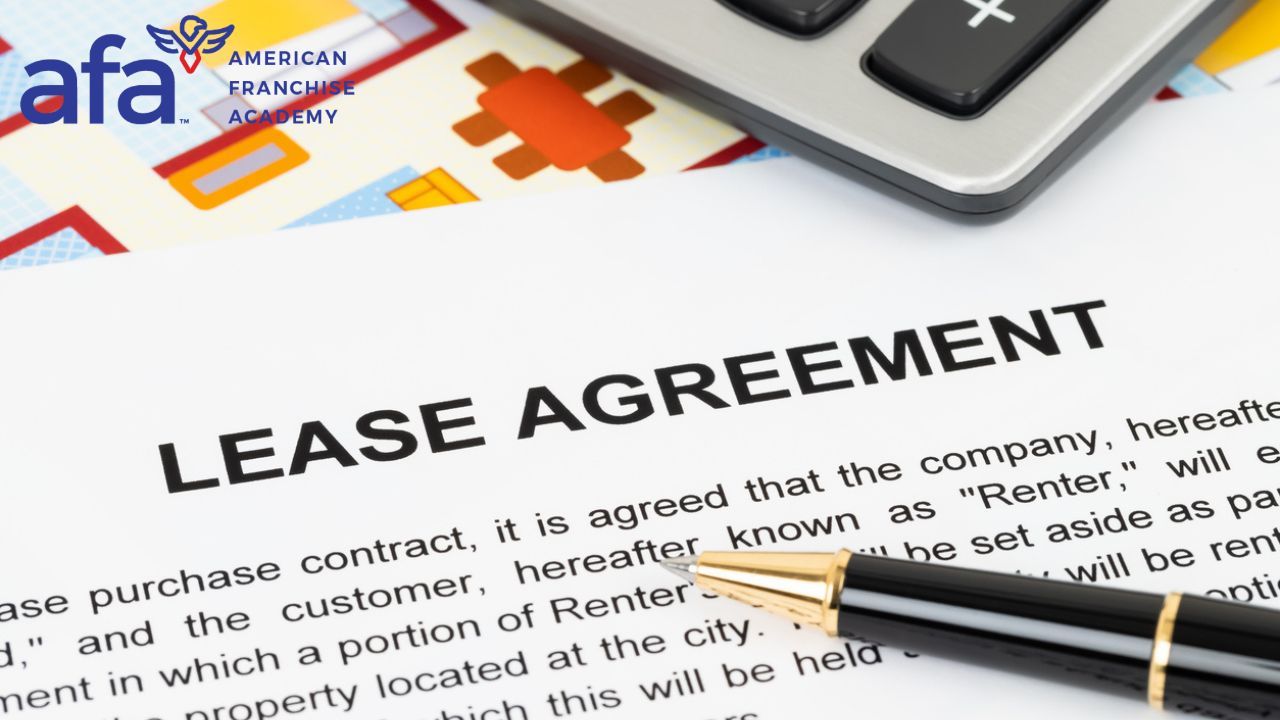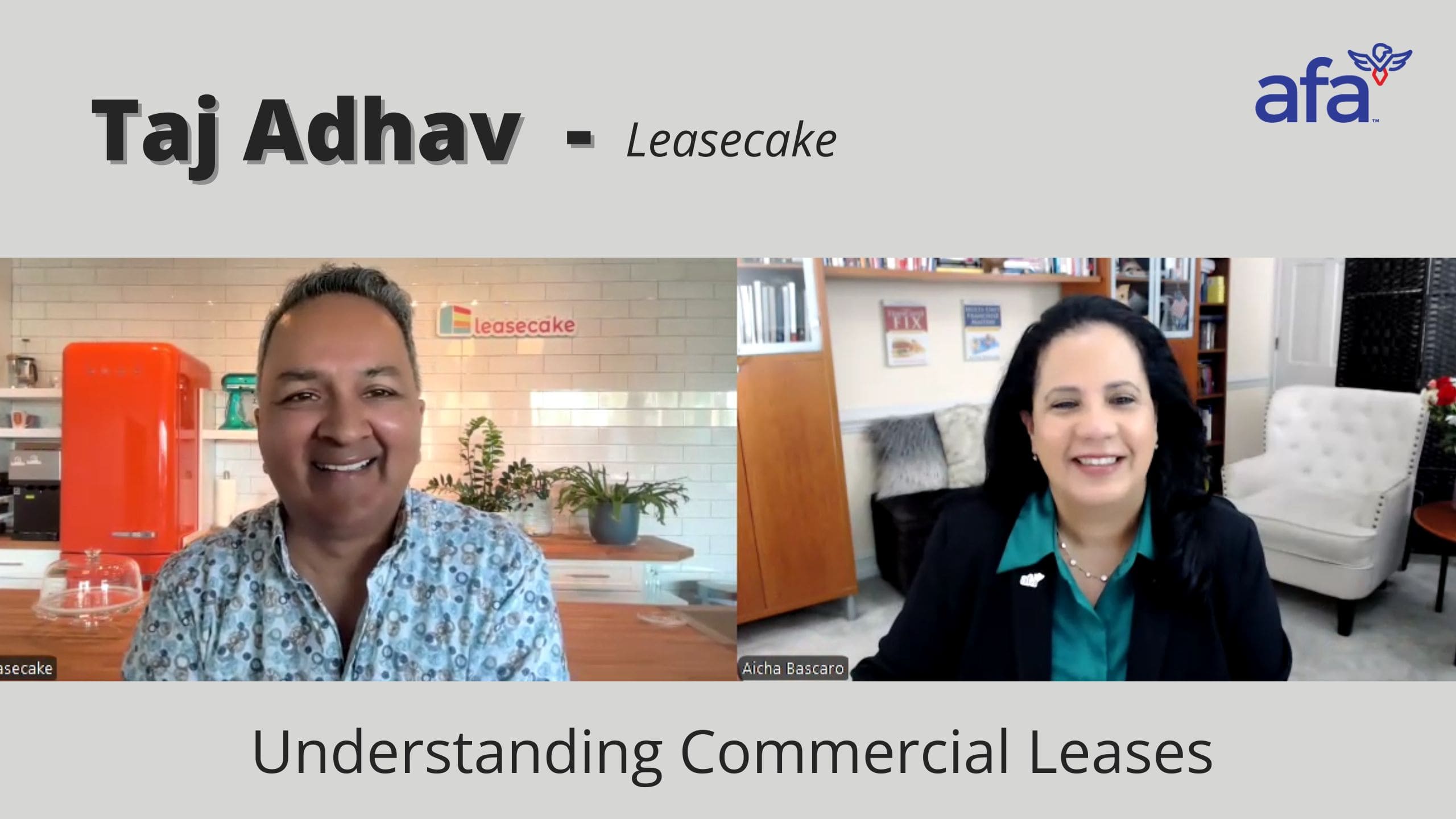Understanding the Lease Agreement: A Guide for Business Owners

Leases are one of the biggest relationships that franchisees have in their business, right after the franchise agreement. They are just as crucial, because whatever they negotiate in that lease could make or break their business.
That’s why I invited Taj Adhav, from the platform LeaseCake, to our latest Franchise Supporters Podcast so that he could give us an easy-to-understand lease agreement guide for business owners.
He also shared the importance of properly managing commercial real estate leases, especially for multi-unit franchisees who are growing their locations, as well as some recommendations for negotiating favorable lease terms and avoiding hidden costs and risks.
Don’t forget to subscribe to our YouTube channel and Podcast, and follow us on all social platforms.
Who is Taj Adhav?
Taj is the co-founder of Leasecake, a lease and location management solution built with the multi-unit operators in mind, so they can have the control, visibility, and scalability they’ve been missing. They centralize the complexity of multi-unit locations in the restaurant and service-based retail industry in a single platform to simplify the chaos, reduce the risk, and make faster and smarter decisions.
Understanding Lease Terminology
A real estate lease is a binding contract between two parties about the place where you will start your business. It’s an obligation, and those obligations mean risk for you. Leases have certain terminology, language, and acronyms you might not be familiar with. These are a few to get you started:
LOI: Letter of Intent
A document that outlines the preliminary lease agreement you and the landlord will sign. The purpose of an LOI is to clarify basic terms, conditions, and intentions before formalizing the transaction. It's non-binding and will probably take a couple of months to negotiate.
Both the landlord and you have to sign it; however, as Taj pointed out, “this is just the first step and where the work really begins, since this document only states that you have an intention of renting, but nothing is totally done yet.”
LOC: Letter of Credit
Instead of providing a cash deposit to secure a location, the bank guarantees the money to the landlord if you default. While a LOC offers some assurance to the landlord, it could also pose an additional risk to your business if you don’t pay on time.
“If you are a large franchise brand with many locations, or you are growing and your AUVs are strong, you may not need one. Your franchisor could even sign as the guarantor, but those are the things that you really need to watch for”, mentioned Taj.
CAM: Common Area Maintenance
These are all the extras you get as a benefit of being in that space. While the landlord is potentially obligated to pay for it, you will get an allocated share of that cost. This includes parking lot lights, landscaping, signage, snow removal, and general maintenance of the space around you, as well as anything that would be shared by all of the other tenants.
“You have to make certain that the lease has the exact square footage that you're leasing, and that that common area maintenance is based on the percentage of the space that you have in that plaza”, Taj warned.
NNN: TripleNet
And it means you pay the base rent, plus three extras: your share of taxes, the insurance for the entire development, and the maintenance of the common area.
The Importance of Knowing and Managing Your Lease
Finding the perfect location could be quite challenging, and when you finally encounter the ideal one, you could be so excited that you want to have it signed. However, if you rush into it or don’t pay enough attention, you could make costly mistakes.
Managing your lease and understanding what's going on is critical for a business owner because not doing it can truly affect your business if you are not paying attention.
When I was Director of Operations for a big franchise brand, one of our top-performing company units faced a CAM issue: the parking lot suddenly sank due to an old pipe running underneath, creating a large hole. The street damage was the city’s responsibility, but because of how the negotiations were handled and the way the lease was written, we were responsible for everything that had happened in our parking lot! As a result, some parking spaces were lost.
We had to coordinate with the city and our development teams to fix the problem, which cost hundreds of thousands of dollars. This situation drove customers away, and sales declined. The impact was significant, and it took a long time to resolve.
Keep learning: Finding the Right Franchise Location. Six Elements to Win
Another anecdote: a franchisee had its HVAC unit break down, and the business owner did not realize they were responsible for repairs. They thought their landlord would handle the repair because they were tenants; however, this was not the case, and they were hit with an $8,000 bill to fix it.
If your lease agreement states that you are responsible for certain repairs and maintenance, your emergency fund should be larger than it would be if you didn't have to cover those potential issues.
These are just a couple of examples of why you have to understand and manage the elements in your lease agreement to ensure that your business remains protected and safe and that you can cover every obligation you signed for.
Key Points to Negotiate in Lease Agreements
You have to be smart enough to negotiate the lease terms and favor your business as much as possible. “The goal is for that real estate lease to be in compliance so that you can keep as much of that hard-earned money as possible in your pocket, and avoid surprises”, Taj said.
“Everything's negotiable, up to a point”, affirmed Taj. “But you have to hammer out in your LOI the things that are non-starters”. What’s negotiable obviously varies by tenant, but there are things that business owners should consider when looking at leases.
Taj mentioned, for example, negotiating some concessions, such as getting free rent before your opening date, since you can only afford to pay rent after the franchise starts selling. Within this concession, make sure you include an extension for late opening or build-out delays.
“If you have a condition in there, you can certainly save thousands of dollars. We've got story after story of very favorable conditions that people were able to negotiate to help manage and mitigate any construction delays”, he shared.
You could also obtain a TIA (Tenant Improvement Allowance) if the landlord really wants your business in that space to have a broad mix across that plaza.
Another thing Taj advises business owners is to negotiate how the base rent will increase over time as the lease progresses. You must be aware of the accelerators (for example, the consumer price index, inflation, or market rate) to ensure you can afford it.
Regarding CAM charges, you can negotiate that the landlord would be responsible if your cap exceeds a specified amount, like the hole in my parking lot. “Trying to avoid as much gray area as possible is really the key”.
Also, you must demand an exclusivity provision to prevent the landlord from putting in a competitor right next door to you, affecting your sales projections.
In case you missed it: The Top 10 Franchisee Challenges (and How to Overcome Them)
Another clause you must understand and negotiate is the termination options in case you want or need to relocate your business. “If you give the landlord X amount of months' notice and meet certain conditions, like paying on time, you could terminate your lease at no cost before the term is complete. That way, you won’t be forced to continue paying rent in a place you don’t want”.
On the other hand, if you are truly happy with your location, you must keep in mind that there’s a specific time frame for informing the landlord that you want to renew the lease.
Taj suggests keeping the renewal deadlines in mind or, if you have multiple units, using a platform solution to remind you of the due date well in advance so you can evaluate your options.
“If you forget that date, the landlord could say, ‘I'm sorry, you were supposed to tell me 180 days before,’ and you could lose that space”, Taj explained. “There is no such thing as a grace period, and if they give you one, they could raise your rent to make it work”.
You don't want to be at a disadvantage. That would impact the team, the customers, the revenue, not to mention your reputation. So you'd never want to be caught missing a renewal option.
It's not just renewal deadlines. It's when your personal guarantee burns off, it’s the letter of credit, the co-tenancy, the critical clauses, and all the other complexities of the game of real estate.
“You shouldn't manage your leases without the right tools or software, because one date, one misdate, one overlooked clause can hit you big, especially as you get bigger”.
Taj recommends that business owners with a growth mindset and more than five locations migrate their lease management from spreadsheets to a professional platform. That way, they will reduce the complexity of managing the lease agreements of multiple units.
As a business owner, you should focus on building your business empire, but you also need to have information to make smarter decisions about your company's current and future path. The best thing is that you don’t need to have a vast real estate team. If you have a system that consolidates everything and allows technology to work for you and your organization, you'll be able to manage and analyze your options more easily.
Leasecake has over 40,000 customers and locations on its platform, and they work with hundreds of brands globally. If you want to learn more about Leasecake and its services, visit Leasecake.com
WATCH THIS VIDEO PODCAST BELOW:




